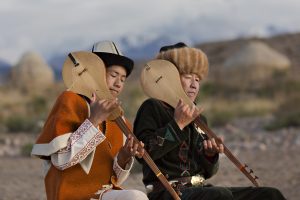Prosecutors in Kyrgyzstan have asked a court in the capital to convict musician Askat Zhetigen and sentence him to eight years in prison.
Zhetigen was arrested in mid-March on charges of calling for the seizure of power and mass unrest allegedly via video posts on Facebook. According to reporting at the time by 24.kg, Zhetigen had posted a video criticizing Kyrgyz President Sadyr Japarov, using “profanity.” After being released, he was quickly detained again and placed in pre-trial detention.
In a Facebook post after his initial arrest, Zhetigen expressed thanks to those who had show support for him – even those who criticized his words as being disrespectful.
“All good and bad words spoken are for the good! Even those who criticized me for swearing… understood the essence of what I said,” he wrote. He went on to admit showing bad manners, but that “The truth must be called the truth.” He also wrote that the “Eki Dos” (“two friends,” a reference to Japarov and the head of the State Committee for National Security Kamchybek Tashiev) had become “insolent.”
Zhetigen is a prominent musician; he is often referred to as an “akyn” (or aqyn).
The art of the akyn – a distinctive combination of improvisational singing and music accompaniment (typically a Kazakh dombyra or Kyrgyz komuz) – was inscribed on UNESCO’s list of intangible cultural heritage in 2008 and aitys(h) – a contest of improvised oral poetry between two akyn – was added in 2015. To oversimplify the latter: It’s like a rap battle with guitars.
These poet-singers, versed in improvisation and tapping into popular sentiment, have increasingly been seen through an a activist lens, though arguably they have always served such a function. As Assem Kalkamanova and Akylai Otkulbek kyzy noted in a recent report published by the Oxus Society for Central Asian Affairs, citing additional research on music in Central Asia, “Historically, aqyns spoke on behalf of people and publicly criticized leaders for their wrongdoings and injustices.” The report, which explores aitys(h) as a form of civic activism in Kazakhstan and Kyrgyzstan, importantly makes the observation that:
It can be acknowledged that in Kyrgyzstan the term “activist” has undergone a transformation in popular perception, influenced by the country’s authoritarian turn under Japarov and Russian-language discourses on “foreign agents,” now often evoking images of radical protesters. As a result, conventionally, aqyns do not commonly regard themselves as activists.
The report cites an instance in which one akyn, Bayan Akmatov “sang that there is no friendship in politics (referring to current president Sadyr Japarov and his friend and the head of the Kyrgyz security service Kamchibek Tashiev) and immediately added: ‘I’d rather hold my tongue so that not to become a neighbor of Olzhobay Shakir.’”
Olzhobay Shakir is a Kyrgyz writer and government critic who was sentenced to five years in prison in Kyrgyzstan for social media posts criticizing the transfer of four resorts on Issyk-Kul to the Uzbek government. He was convicted on charges that mirror those against Zhetigen.
This trend of punishing critics with prison time does not bode well for Zhetigen’s case, despite the fact that during the trial two “experts” arrived at two different conclusions when examining the akyn’s statements: One reportedly saw in the video a call to overthrow the government and the other didn’t.
Zhetigen has spoken out about gambling in Kyrgyzstan and the recent change of the country’s flag; he condemned the arrest of activists and was vocal on other issues – in the grand tradition of Kyrgyz akyns going back centuries.
As reported by Kloop, Zhetigen called the accusations against him “baseless,” adding, “The Kyrgyz Republic is a democratic country in which every citizen has the right to express their own opinion. I believe that one cannot be held accountable for this.”

































